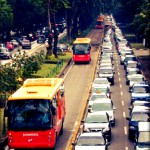 Public transport has a key role in transportation policies as it makes the use of road space more efficiently than car. If some car users go to public transport, both users who would actually earn the benefits from the improved levels of service as traffic would be less congested. But, the emergence of individual driver with a number of immediate advantages has made the car users unwilling to switch. The car is then perceived as cheap, effective and efficient, as well as it has a link to feelings of convenience and independence. This particular type of interdependence between car and public transport users with conflicting individual and collective interests can be framed as a social dilemma.
Public transport has a key role in transportation policies as it makes the use of road space more efficiently than car. If some car users go to public transport, both users who would actually earn the benefits from the improved levels of service as traffic would be less congested. But, the emergence of individual driver with a number of immediate advantages has made the car users unwilling to switch. The car is then perceived as cheap, effective and efficient, as well as it has a link to feelings of convenience and independence. This particular type of interdependence between car and public transport users with conflicting individual and collective interests can be framed as a social dilemma.
 Public transport has a key role in transportation policies as it makes the use of road space more efficiently than car. If some car users go to public transport, both users who would actually earn the benefits from the improved levels of service as traffic would be less congested. But, the emergence of individual driver with a number of immediate advantages has made the car users unwilling to switch. The car is then perceived as cheap, effective and efficient, as well as it has a link to feelings of convenience and independence. This particular type of interdependence between car and public transport users with conflicting individual and collective interests can be framed as a social dilemma.
Public transport has a key role in transportation policies as it makes the use of road space more efficiently than car. If some car users go to public transport, both users who would actually earn the benefits from the improved levels of service as traffic would be less congested. But, the emergence of individual driver with a number of immediate advantages has made the car users unwilling to switch. The car is then perceived as cheap, effective and efficient, as well as it has a link to feelings of convenience and independence. This particular type of interdependence between car and public transport users with conflicting individual and collective interests can be framed as a social dilemma.
In general, the ways for resolving the dilemma can be categorized into two kinds of approach. First, structural approach (‘hard’ measure), for example by: changing payoff structure (e.g. congestion charging), reward and punishment (e.g. incentives for public transport users, restriction on car parking), and situational change (e.g. residential or workplace relocation). Second, psychological approach (‘soft’ measure), for example by: increasing individual’s awareness of the environmental impacts of excessive car use (e.g. travel awareness campaign) and providing advice and information to encourage the use of alternative modes to the car (e.g. travel plan, individualized marketing).
Structural interventions, which concentrate on changing personal material incentives (e.g. time, cost, and comfort) associated with travel mode options, seem to be more effective since enforcements by the authority are also at force. Congestion charging has been proved to be successful in London, but it is still a controversial issue in other cities in the UK, and is still under government consideration to be implemented in Jakarta. In this situation, ‘soft’ measures, which do not incur additional economic costs on travellers, may offer an alternative option.
Provided that ‘soft’ measures are voluntary by nature and have no economic consequences (e.g. penalty from the authority) if travellers do not comply with the measures, ‘soft’ measures may become attractive for travellers. However, these characteristics have also drawbacks as it is difficult to ensure the sustainability of travellers’ participation in the long term. Despite successful implementation of soft measures in pilot projects, there remains lack of evidence on sustainability of impacts. Studies argued that a demand management measure that relies on voluntary cooperation by individuals should be implemented only after it receives support from individuals that constitute the critical mass that is needed for pro-social behaviour to prevail. The critical mass depends on the conditional probability that an individual will cooperate, given cooperative behaviours of other individuals.
 Studies also suggested that social-psychological aspects exist in travellers’ behaviour thus affecting their travel decisions, but we are often unaware of their importance and may underestimate their role. It is an interesting phenomenon to find that some car users interact with other people and may decide to reduce their car use if a significant number of individuals also reduce theirs. They make decision on whether to cooperate or not based on their expectations of others’ action. The more people cooperate, the more this action will influence the others. Forms of social learning or social imitation may also exist when people can observe and learn from other’s behaviour or experience, and then decide to follow what others do. Some people may decide to use bus to travel to workplace after they learned from their colleagues who regularly use bus that the bus service is much better than they expected. Investigation of these aspects offers potential benefits to the study of travel behaviour and more importantly to the development of transportation policies that will help the authorities to resolve chronic problems of transportation such as in the capital as well as other big cities in Indonesia.
Studies also suggested that social-psychological aspects exist in travellers’ behaviour thus affecting their travel decisions, but we are often unaware of their importance and may underestimate their role. It is an interesting phenomenon to find that some car users interact with other people and may decide to reduce their car use if a significant number of individuals also reduce theirs. They make decision on whether to cooperate or not based on their expectations of others’ action. The more people cooperate, the more this action will influence the others. Forms of social learning or social imitation may also exist when people can observe and learn from other’s behaviour or experience, and then decide to follow what others do. Some people may decide to use bus to travel to workplace after they learned from their colleagues who regularly use bus that the bus service is much better than they expected. Investigation of these aspects offers potential benefits to the study of travel behaviour and more importantly to the development of transportation policies that will help the authorities to resolve chronic problems of transportation such as in the capital as well as other big cities in Indonesia.
a href=”http://www.sbm.itb.ac.id/yos-sunitiyoso”>Yos Sunitiyoso, ST, MEng, PhD
Deputy Director for MBA Jakarta
Lecturer in Strategic Decision Making & Negotiation
Full Article can be found in MBA-ITB Business Review Vol. 7 No. 1 2012
In general, the ways for resolving the dilemma can be categorized into two kinds of approach. First, structural approach (‘hard’ measure), for example by: changing payoff structure (e.g. congestion charging), reward and punishment (e.g. incentives for public transport users, restriction on car parking), and situational change (e.g. residential or workplace relocation). Second, psychological approach (‘soft’ measure), for example by: increasing individual’s awareness of the environmental impacts of excessive car use (e.g. travel awareness campaign) and providing advice and information to encourage the use of alternative modes to the car (e.g. travel plan, individualized marketing).
Structural interventions, which concentrate on changing personal material incentives (e.g. time, cost, and comfort) associated with travel mode options, seem to be more effective since enforcements by the authority are also at force. Congestion charging has been proved to be successful in London, but it is still a controversial issue in other cities in the UK, and is still under government consideration to be implemented in Jakarta. In this situation, ‘soft’ measures, which do not incur additional economic costs on travellers, may offer an alternative option.
Provided that ‘soft’ measures are voluntary by nature and have no economic consequences (e.g. penalty from the authority) if travellers do not comply with the measures, ‘soft’ measures may become attractive for travellers. However, these characteristics have also drawbacks as it is difficult to ensure the sustainability of travellers’ participation in the long term. Despite successful implementation of soft measures in pilot projects, there remains lack of evidence on sustainability of impacts. Studies argued that a demand management measure that relies on voluntary cooperation by individuals should be implemented only after it receives support from individuals that constitute the critical mass that is needed for pro-social behaviour to prevail. The critical mass depends on the conditional probability that an individual will cooperate, given cooperative behaviours of other individuals.
 Studies also suggested that social-psychological aspects exist in travellers’ behaviour thus affecting their travel decisions, but we are often unaware of their importance and may underestimate their role. It is an interesting phenomenon to find that some car users interact with other people and may decide to reduce their car use if a significant number of individuals also reduce theirs. They make decision on whether to cooperate or not based on their expectations of others’ action. The more people cooperate, the more this action will influence the others. Forms of social learning or social imitation may also exist when people can observe and learn from other’s behaviour or experience, and then decide to follow what others do. Some people may decide to use bus to travel to workplace after they learned from their colleagues who regularly use bus that the bus service is much better than they expected. Investigation of these aspects offers potential benefits to the study of travel behaviour and more importantly to the development of transportation policies that will help the authorities to resolve chronic problems of transportation such as in the capital as well as other big cities in Indonesia.
Studies also suggested that social-psychological aspects exist in travellers’ behaviour thus affecting their travel decisions, but we are often unaware of their importance and may underestimate their role. It is an interesting phenomenon to find that some car users interact with other people and may decide to reduce their car use if a significant number of individuals also reduce theirs. They make decision on whether to cooperate or not based on their expectations of others’ action. The more people cooperate, the more this action will influence the others. Forms of social learning or social imitation may also exist when people can observe and learn from other’s behaviour or experience, and then decide to follow what others do. Some people may decide to use bus to travel to workplace after they learned from their colleagues who regularly use bus that the bus service is much better than they expected. Investigation of these aspects offers potential benefits to the study of travel behaviour and more importantly to the development of transportation policies that will help the authorities to resolve chronic problems of transportation such as in the capital as well as other big cities in Indonesia.
Yos Sunitiyoso, ST, MEng, PhD
Deputy Director for MBA Jakarta
Lecturer in Strategic Decision Making & Negotiation
Full Article can be found in MBA-ITB Business Review Vol. 7 No. 1 2012



